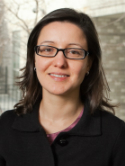SRC family kinase inhibition targets YES1 and YAP1 as primary drivers of lung cancer and as mediators of acquired resistance to ALK and epidermal growth factor receptor inhibitors Journal Article
| Authors: | Sato, H.; Kubota, D.; Qiao, H.; Jungbluth, A.; Rekhtman, N.; Schoenfeld, A. J.; Yu, H. A.; Riely, G. J.; Toyooka, S.; Lovly, C. M.; Paik, P.; Ladanyi, M.; Fan, P. D. |
| Article Title: | SRC family kinase inhibition targets YES1 and YAP1 as primary drivers of lung cancer and as mediators of acquired resistance to ALK and epidermal growth factor receptor inhibitors |
| Abstract: | PURPOSE The identification of novel oncogenic driver alterations and novel mechanisms of acquired resistance (AR) is the key for further development of personalized therapy. The current study investigates the potential role of YES1 amplification as a primary driver of tumorigenesis and of YES1/YAP1 amplifications as mediators of AR to ALK and epidermal growth factor receptor (EGFR) tyrosine kinase inhibitors (TKIs). METHODS Models of ectopic expression were established and characterized for YES1 and YAP1 in human bronchial epithelial cells and ALK fusion-positive (ALK+) and EGFR-mutant lung adenocarcinoma cell lines. MSK-IMPACT data for all lung adenocarcinoma cases and for ALK and EGFR TKI AR cases were surveyed for YES1 and YAP1 amplification. RESULTS We report response to SRC family kinase (SFK) inhibition in a patient whose lung cancer exhibited YES1 amplification, without any well-established primary driver alteration, suggesting that YES1 amplification can also function as a primary oncogenic driver. To investigate the possibility of YES1 as a primary driver in tumorigenesis, we established preclinical models of YES1 overexpression using human bronchial epithelial cells and normal human breast epithelial cells. We showed that YES1 overexpression conferred sensitivity to SFK TKIs and promoted EGF- independent growth in a YAP1-dependent manner. Analysis of clinical genomic sequencing data from cases of AR to EGFR and ALK inhibitors revealed acquired amplification of YAP1 in four cases. EGFR-mutant and ALK fusion-positive cells overexpressing YES1 or YAP1 were resistant to EGFR and ALK TKIs, respectively, but were sensitive to dual inhibition of the primary driver and YES1. CONCLUSION Our results demonstrate the therapeutic potential of SFK inhibition in primary tumorigenesis and AR driven by YES1/YAP1 signaling. |
| Keywords: | dasatinib; phase-ii trial |
| Journal Title: | JCO Precision Oncology |
| Volume: | 6 |
| ISSN: | 2473-4284 |
| Publisher: | American Society of Clinical Oncology |
| Date Published: | 2022-01-01 |
| Start Page: | e2200088 |
| Language: | English |
| ACCESSION: | WOS:000975488400048 |
| DOI: | 10.1200/po.22.00088 |
| PROVIDER: | wos |
| PMCID: | PMC9384924 |
| PUBMED: | 35952318 |
| Notes: | The MSK Cancer Center Support Grant (P30 CA008748) is acknowledged in the PubMed record and PDF. Corresponding author is MSK author Marc Ladanyi -- Source: Wos |
Altmetric
Citation Impact
BMJ Impact Analytics
MSK Authors
Related MSK Work











